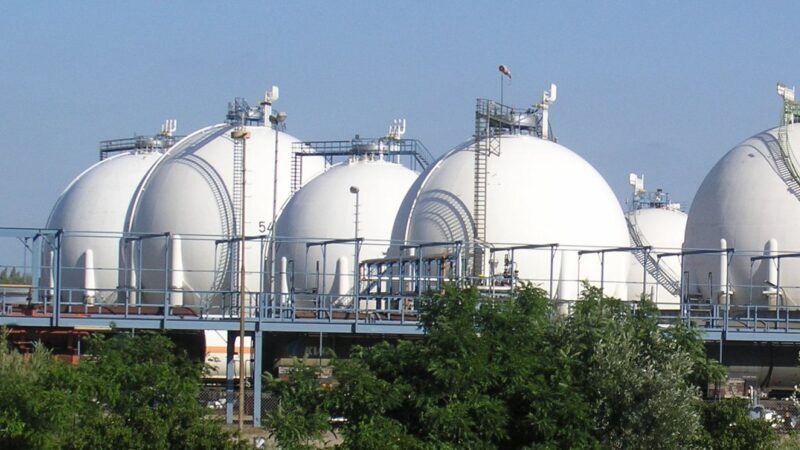EU energy ministers greenlit a plan on Tuesday (26 July) to reduce gas consumption and prepare for potential disruptions to Russian gas flows after a power struggle with the European Commission over who could implement mandatory targets.
Last week, Brussels proposed for EU countries to reduce their gas consumption by 15% between August 2022 and March 2023, in order to ensure enough gas is in storage for this winter and next.
The plan, however, was met with resistance from EU member states. Particular criticism was aimed at the proposal allowing the European Commission to change the voluntary 15% target into one that is mandatory without consultation with the EU-27.
Following the pushback, the Czech Presidency of the EU Council redrafted the text to make it more palatable for EU countries and wrangle power back from the European Commission.
The new text was met with widespread support, with 26 of the 27 countries voting in favour. Hungary was the only one against the deal, according to Euractiv.cz.
Under the approved text, the Commission would still propose the highest level of alert, which triggers the mandatory target, but EU countries would then vote to approve it. Alternatively, at least five countries that have declared national alerts can request the European Commission to present the EU-wide alert.
Other changes include exemptions from the mandatory target for island countries, like Ireland and Malta, which are not connected to the EU gas grid.
Exemptions also cover EU countries whose electricity grids are synchronised with countries outside of the EU and may need to fuel their electricity production with gas in case of an emergency desynchronisation.
There are also several derogations available to EU countries, including “if they have overshot their gas storage filling targets, if they are heavily dependent on gas as a feedstock for critical industries or if their gas consumption has increased by at least 8% in the past year compared to the average of the past five years”.
However, the Czech industry and trade minister Jozef Sikela was clear that these exemptions would not impact the overall savings.
“The common understanding is that the sum of the exemptions should not impact the target volume of the saved gas,” he told journalists as he arrived for the meeting.
Meanwhile, Irish minister Eamon Ryan told journalists that, although his country would benefit from the exemption because of its “physical reality”, it did not stop “the basic desire of all of us to reduce our use”.
“In Ireland’s case, while we’re not physically connected, we’re hit by the high prices and that’s why it makes sense for us to use less,” he added.
The meeting comes only a day after Gazprom announced it would further reduce gas flows to Germany, creating fresh concerns about Europe’s energy security.
Gazprom’s announcement underlines “once again that we have to be ready for possible supply cuts from Russia at any moment,” said EU energy chief Kadri Simson. To prepare, Europe must act now and together to preemptively reduce demand, she added.
Already, 12 EU countries have faced complete or partial cut-offs of their Russian gas supply and European Commission President Ursula von der Leyen has warned that a complete cut-off from Russian gas is a “likely scenario”.
In light of this, high storage levels are essential to get through this winter and avoid difficulties filling gas storage for winter 2023, said energy commissioner Simson as she announced the plan last week.
Gas storage levels have now hit 66%, according to the European Commission. But some EU countries still have a lot of work to do to reach the EU’s target of filling its gas storage to at least 80%, said Sikela. The Czech Republic met the target yesterday, he added.
As more Russian gas is cut off, many eyes are on Germany, which is highly reliant on Russian gas and has spent years strengthening gas connections to Russia. This includes building Nord Stream 2, which drew criticism from Berlin’s eastern neighbours.
Speaking on French TV, gas expert Thierry Bros said that “Germany is the European weak link”.
“Without European solidarity, Germany will suffer much more than all other European countries. With European solidarity, all of the EU will suffer. What will the 27 energy ministers choose?” he asked on Twitter.
Germany, Austria, Hungary and Italy are particularly vulnerable to disruptions in Russian gas supply due to their high dependence on Russian flows.
But despite the idea that solidarity could mean propping up Germany, many ministers attending the meeting emphasised the need for it.
“Unity and solidarity is the best weapon we have against Putin,” said Sikela.
Meanwhile, von der Leyen welcomed the agreement, saying: “By acting together to reduce the demand for gas, taking into account all the relevant national specificities, the EU has secured the strong foundations for the indispensable solidarity between Member States in the face of the Putin’s energy blackmail.”
Some countries still want to go further when it comes to Russian gas: the Polish and Estonian ministers both repeated calls for a full ban on imports.
“If we all put in the effort that is asked, we do enough to successfully survive the winter. But looking into the future, of course, losing all dependence on Russian energy is essential,” said Estonian minister Riina Sikkut.
This article was produced by Euractiv and republished under a content sharing agreement.
